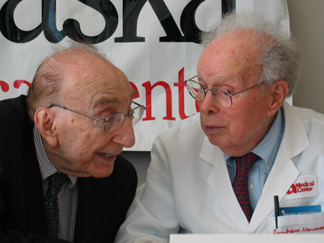 |
Dr. Denham Harman, right, talks with world-renowned surgeon Michael DeBakey, M.D., during his visit to campus last year. Photo by Walter Brooks. |
Dr. Harman, UNMC Emeritus Millard Professor of Medicine, continues to be an active scientist. He presented two papers in Arhus, Denmark, last August, had two papers recently accepted by the New York Academy of Sciences and is scheduled to speak at an aging conference in Greece in May 2007.
Dr. Harman is internationally known for his 1954 free radical theory of aging.
The Free Radical Theory of Aging proposed by Dr. Harman 50 years ago laid the groundwork for one of the most well-known and respected theories on the aging process. Known internationally as the father of the free radical theory of aging, he proposed that free radicals, highly reactive molecules freed in the normal chemical processes, cause aging and disease through their destructive actions in cells and tissues.
His theory, first ridiculed and dismissed by many in the scientific community, gained support by the 1960s, and by the 1980s was considered one of the principal theories of aging.
Dr. Harman proposed the theory in 1954 while working as a research associate at the Donner Laboratory of Medical Physics at the University of California, Berkeley. Years later, in laboratory mouse models, Dr. Harman employed antioxidants such as vitamins E, C and beta carotene to reduce the cancer-causing and atherosclerosis-causing effects of free radicals.
Beginning with an interest in the basic mechanisms of aging, his work has produced insights into potential means to delay age-related conditions and most recently has turned to mechanisms involved in Alzheimer’s disease. Dr. Harman’s theory laid the groundwork for a great deal of research and interest in the aging process, and the discovery of the potential of antioxidants to fight off cancer, heart disease and other degenerative effects of aging.